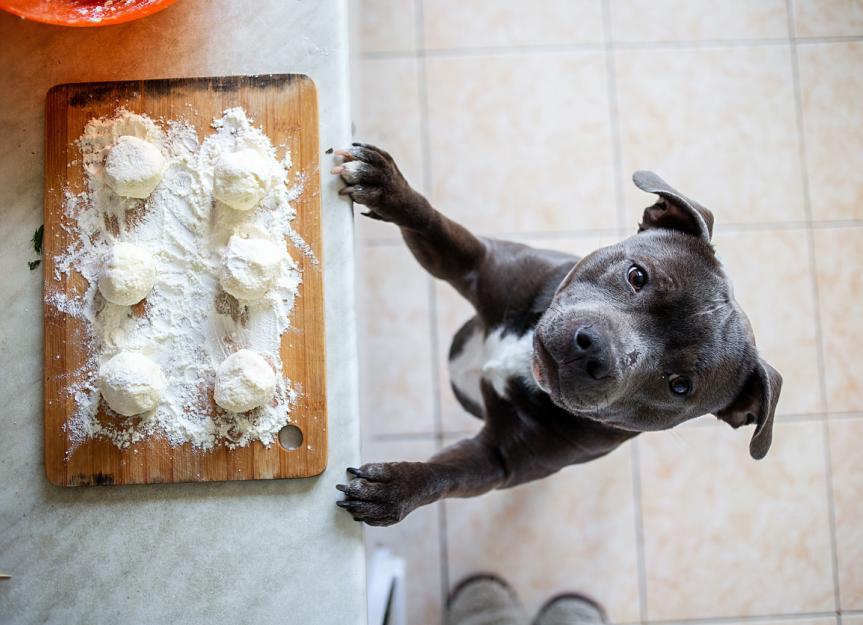Have you ever wondered if it’s safe for dogs to eat bread? While most breads are not toxic for dogs, it’s important to be aware of the ingredients that can be harmful to them. In this article, we will explore whether dogs can eat pita bread and provide some important information about bread consumption for our furry friends.
Is Bread Bad for Dogs?
Humans enjoy bread as a staple food in many meals, but dogs don’t really need it in their diet. While regular white or wheat bread is not toxic to dogs, it doesn’t provide much nutritional value either. In fact, feeding your dog bread regularly can lead to obesity or even diabetes. Therefore, it’s best to avoid regularly giving bread to your dog.
Can Dogs Eat Bread Dough?
While a slice of bread is generally safe for dogs, it’s important to note that yeast-based bread dough can be dangerous and cause bread dough toxicosis. When dogs consume yeast-based dough, their stomach promotes the expansion of the dough and the production of ethanol by the yeast. This can cause bloat, a life-threatening condition that can lead to gastric dilatation and volvulus (GDV). Additionally, alcohol intoxication can occur due to the dough’s fermentation process.
If your dog accidentally eats any yeast-based bread dough, it’s crucial to contact your veterinarian immediately. Some symptoms of bread dough toxicosis include dry heaving, abdominal distention (bloat), decreased activity, impaired gait and reflexes, weakness, seizures, and even death.
What Types of Bread Can Dogs Eat?
While some breads are safe for dogs to consume in moderation, others contain ingredients that are toxic to them. It’s important to keep your dog away from breads that contain chocolate, xylitol (a preservative and sweetener), raisins, garlic, onion, nutmeg, or nuts. Additionally, large amounts of butter, salt, and sugar in bread are not good for our furry friends.
Let’s address some specific types of bread and whether they are safe for dogs:
Can Dogs Eat Wheat Bread?
Yes, plain wheat bread is generally safe for dogs in small amounts, unless your dog has a wheat allergy.
Can Dogs Eat Sourdough Bread?
As long as the sourdough is fully cooked, a small piece should not harm your dog. However, raw sourdough can cause serious health problems.
Can Dogs Eat Garlic Bread?
No, garlic is toxic to dogs, and many recipes for garlic bread contain onion, which is also toxic.
Can Dogs Eat Banana Bread?
No, while bananas are safe for dogs, many banana breads contain ingredients like sugar, raisins, macadamia nuts, or nutmeg, which can be harmful to dogs.
Can Dogs Eat White Bread?
Yes, plain white bread is generally safe for dogs in small amounts, unless your dog has a wheat allergy.
Can Dogs Eat Rye Bread?
Yes, plain rye bread is generally safe for dogs in small amounts, unless your dog has a wheat or grain allergy.
Can Dogs Eat Pumpkin Bread?
No, while pumpkin itself is a safe snack for dogs, pumpkin bread often contains ingredients such as nutmeg, which can be toxic.
Can Dogs Eat Pita Bread?
Yes, as long as the pita bread is plain, without any toxic ingredients, and your dog doesn’t have a wheat or grain allergy, it is safe for them to consume in small amounts.
Can Dogs Eat Gingerbread?
No, gingerbread contains a large amount of sugar and often includes nutmeg, which can be harmful to dogs.
What To Do if Your Dog Ate Bread or Bread Dough
If your dog consumes any yeast-based dough or bread with toxic ingredients, it’s important to contact your veterinarian right away. However, if your dog eats a fully cooked and non-toxic piece of bread such as pita bread, she should be fine. In case your dog gets into a large amount of bread, such as a whole package of hamburger buns, she may experience some mild stomach upset. Always consult your vet if your dog ingests anything she shouldn’t.
Frequently Asked Questions
Conclusion
In conclusion, while dogs can eat some types of bread, it’s crucial to be aware of the ingredients that can be toxic or harmful to them. Pita bread is generally safe for dogs to eat in moderation, as long as it is plain and does not contain any ingredients that are toxic to dogs. However, always consult with your veterinarian to ensure that any new foods you introduce to your dog’s diet are safe for them.
Remember that the best way to keep your dog healthy and happy is by providing a balanced and nutritious diet specifically formulated for their needs.
